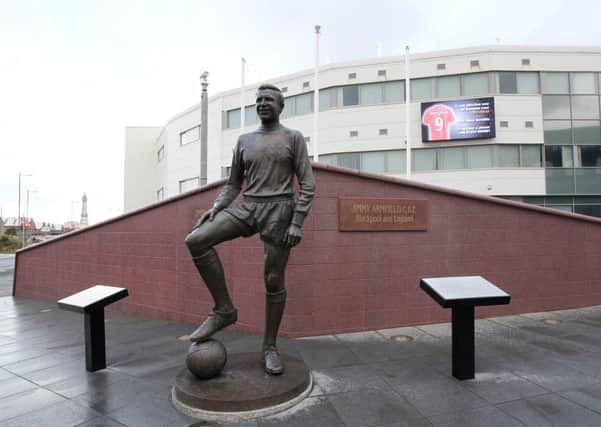Armfield recalls Anglo-Scot rivalry


The Blackpool man was proud to be in the side that beat Scotland 9-3 at Wembley in 1961, one of England’s finest hours in the post-war era.
But he also knows what it is like to be beaten in front of a fiercely partisan crowd at a jam-packed Hampden Park.
Advertisement
Hide AdAdvertisement
Hide AdThat ‘61 drubbing is one that all Scots would like to forget, though for those that had to endure it the performance of keeper Frank Haffey is hard to erase from their memory.
However, Armfield, now 81, prefers to dwell on how well England performed that far-off but still-vivid-to-him afternoon; Jimmy Greaves got a hat-trick, Johnny Haynes and Bobby Smith two and there was one apiece for Bobby Robson and Bryan Douglas.
Not that Scotland were mugs that day with the likes of Dave Mackay, Denis Law, Ian St John and Billy McNeill in the side – one of Scotland’s goalscorers was Pat Quinn, a colleague of Armfield at Blackpool at the time.
Recalling the match when Scotland went down like nine-pins, Armfield said: “I remember we were bursting out eyeballs trying to make it 10!”
Advertisement
Hide AdAdvertisement
Hide AdTo get the bragging rights over Scotland was all-important; Anglo-Scottish rivalry even spilled over into the Bloomfield Road dressing room.
Armfield said: “When I first came to Blackpool as a young player, we had England versus Scotland five-a-sides in training.
“There were quite a few Scots at Blackpool at the time, people like George Farm, Hughie Kelly, Ewan Fenton, Jackie Mudie and Allan Brown.
“It got so competitive that Johnny Lynas (the Blackpool trainer at the time) had to kill the five-a-sides off!”
Advertisement
Hide AdAdvertisement
Hide AdArmfield was proud to play in the England team of 1961 that demolished Scotland in such devastating style.
“I remember it well because that was probably the best England team I ever played in,” he said.
“We were in good form at the time; we had got three against Italy, five against Ireland, five against Wales, four against Spain – we played Luxembourg in a World Cup qualifier and won 9-0.
“We had a very strong team back then. Bobby Robson and Johnny Haynes played in midfield, we had Jimmy Greaves and Bobby Smith up front, Bobby Charlton on one wing and Bryan Douglas on the other.
“I would not have liked to have played against that six!
Advertisement
Hide AdAdvertisement
Hide Ad“Scotland had a lot of good players, but England were on fire at the time. All the players were attack-minded.”
By the following year England were in the World Cup finals in Chile when Armfield was named the best full-back in the World Cup, but the tournament, won eventually by Brazil, was to end in disappointment.
Armfield said: “We lost Bobby Smith and Peter Swan, who were two of our strongest players.
“We had beaten Czechoslovakia 4-1 before the World Cup on their own pitch – yet the Czechs got to the World Cup Final and lost to Brazil.”
Advertisement
Hide AdAdvertisement
Hide AdAfter the 9-3 reverse, the Scots won the next three meetings between the two nations, once at Wembley and twice at Hampden Park.
The 1964 meeting saw England succumb in Glasgow to a solitary goal scored by Alan Gilzean.
Armfield recalled: “We were staying at our usual hotel in Troon and all the papers up there were saying that this was the match that Scotland couldn’t lose – and they didn’t, ‘Gillie’ scoring from a corner.
“The noise level at Hampden that day was unbelievable.”
Armfield hopes for – and expects – a win for Gareth Southgate’s men on Friday night at Wembley.
Advertisement
Hide AdAdvertisement
Hide AdHe said: “I have to fancy England to win; I don’t think they are as bad a team as people are saying.
“When Roy Hodgson was in charge, he did everything right up until playing Iceland.
“They won every match in qualifying, but fell for the five-card trick against Iceland.
“England are in a decent World Cup group, but you have to understand that international football has changed.
“Some of the so-called lesser nations are getting better – they have concentrated on the team ethic, as opposed to individual players.”